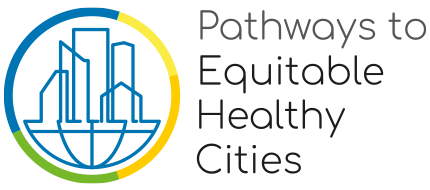Dhaka
Work in Dhaka is led by Pathways consortium members at BRAC James P Grant School of Public Health, BRAC University, and involves collaborations with other partner institutions. We work with partners from local and national government agencies and civil society organisations to look at different aspects of inequalities and to identify areas of contemporary and emerging policy interest.
Reports from three engagement workshops held in September 2022 can be accessed for air and noise pollution, ambient lighting, accessibility and transport.
Policy Briefs : Pathways to Equitable Healthy Cities, a report from the Dhaka work is available to read here.
We combined census and survey data to understand the patterns of poverty at high-resolution in Dhaka by overlaying our high-resolution poverty map with key measures such as density, built-up areas, and housing conditions to understand inequalities in the living environment. This work will provide the basis for targeted policy interventions to alleviate poverty and improve the health and living conditions of the poor.
Read more about the work of the Pathways Poverty and Inequality working group.
Dhaka’s housing stock is insufficient to meet the demand from its rapidly growing population. Concerns are growing about the scarcity of good-quality, secure housing and the dramatic rise in average rental prices, causing affordability issues. We are investigating the variations of these factors across the city and in relation to poverty. We are also probing the linkage between changes in household living standards and chronic health conditions, such as cardiovascular diseases and respiratory illnesses.
In addition, we are investigating patterns of daylight exposure in homes in Dhaka in relation to building features such as proximity and height because insufficient light can affect a range of diseases, especially for women and young children who spend significant time at home in Dhaka.
Due to unplanned rapid urbanisation, Dhaka city lacks adequate green space. We investigate the distribution of green space in the city, the changes in urban greenery over time, and how equitable access to green space is for Dhaka’s residents.
Read more about the work of the Pathways Housing and Neighbourhood working group.
Improper solid waste management practices are linked to several health risks, especially vector-borne diseases. Although the construction of enclosed Secondary Transfer Stations (STSs) has helped to reduce open dumping in Dhaka, there are still many health and environmental concerns related to how waste is managed.
We are investigating the waste management process, from primary generation to disposal, and the geographical distribution of STS sites. This will provide the evidence needed to target improper waste disposal practices including open waste dumping, uncovered waste transportation, and informal waste segregation.
Waterlogging is very common in Dhaka and has become an increasingly significant burden for city dwellers, causing traffic gridlocks, infrastructure damage, and destruction of flora and fauna. It also poses a considerable threat to the health of city dwellers, as pollutants contaminate the clogged or retained water from sewerage.
We aim to identify the most vulnerable zones and populations of waterlogging based on the city’s land-use pattern and population characteristics. We are mapping the surface of waterlogged hazard zones within the Dhaka Metropolitan area and are assessing the degree of vulnerability for each location in different rainfall conditions and based on whether there are informal settlements built-up.
Read more about the work of the Pathways Water and Sanitation and Waste Management working group.
The Dhaka city monitoring campaign will provide a comprehensive environmental dataset of high temporal and spatial resolution for air pollution and noise. The data will be utilised to improve understanding of sources and distribution of environmental pollutants across the city and provide a resource for future application in areas such as health studies, urban planning, public engagement, and enforcement.
We monitor at 8 fixed sites to broadly represent key environments and major sources of air pollution within Dhaka city, including brick kilns, traffic hotspots, markets (biomass burning), high density residential, central business district, suburban residential and background. In addition, approximately 60 rotating sites capture a higher spatial resolution dataset and better represent the diverse characteristics of the city.
Read more about the work of the Pathways Measurement and Monitoring working group.
Related publications
Environmental Monitoring and Assessment, vol. 195, pp. 1509, 2023.
Spatiotemporal Variability of Urban Greenspace and Surface Temperature in Dhaka City: A Public Health Aspect, vol. S.M.A.R.T Environments, pp. 143–169, 2023.
Environmental Monitoring and Assessment, vol. 195, pp. 543, 2023.
Dhaka landfill waste practices: addressing urban pollution and health hazards
Building and Cities, vol. 2, iss. 1, pp. 700–716, 2021.
Occupational Health and Safety Hazards: An Explorative Study of Dhaka City Waste Handlers
Book of Abstracts, 6th International Conference on Public Health 2020 (ICOPH 2020), pp. 66, Committee of the ICOPH 2020.
